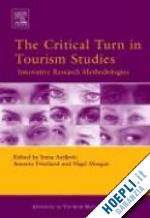Editors’ introduction: Promoting an Academy of Hope (Irena Ateljevic, Nigel Morgan, Annette Pritchard) Part 1 The critical school of tourism studies: Crafting the epistemological grounds De-centring Tourism’s Intellectual Universe, or Traversing the Dialogue Between Change and Tradition. (Annette Pritchard and Nigel Morgan); Critical Tourism: Rules and Resistance (John Tribe); Structural Entanglements and the Strategy of Audiencing as a Reflexive Technique (Candice Harris, Erica Wilson, and Irena Ateljevic); Resisting Rationalisation in the Natural and Academic Life-world: Critical Tourism Research or Hermeneutic Charity? (Tazim Jamal and Jeff Everett); Marking Difference or Making a Difference: Constructing Places, Policies and Knowledge of Inclusion, Exclusion and Social Justice in Leisure, Sport and Tourism (Cara Aitchison); Gender Analysis in Tourism: Personal and Global Dialectics (Margaret Swain and Derek Hall); Interrogating the ‘Critical’ in Critical Approaches to Tourism Research (Donna Chambers); A Realist Critique of the Situated Voice in Tourism Studies (David Botterill); The Problem With Tourism Theory (Adrian Franklin); Tourism, Materiality and Space (Rene van der Duim); “Worldmaking” and the Transformation of Place and Culture: The Enlargement of Meethan’s Analysis of Tourism and Global Change (Keith Hollinshead)Part 2 Methodologies, innovative techniques, methods of interpretation and writing strategiesGrounded Theory: Innovative Methodology or a Critical Turning from Hegemonic Methodological Praxis in Tourism Studies (Gayle Jennings and Olga Junek); Immersing in Ontology and the Research Process: Constructivism the Foundation for Exploring the (In)Credible OBE? (Tomas Pernecky); The Beauty in the Form: Ethnomethodology and Tourism Studies (Scott McCabe); From Principles to Practices in Feminist Tourism Research: a Call for Greater Use of the Survey Method and the Solicited Diary (Bente Heimtun); Unresolved Power for Feminist Researchers Employing Memory-work (Jennie Small); Enhancing the Interpretive and Critical Approaches to Tourism Education Inquiry Through a Discursive Analysis (Maureen Ayikoru and John Tribe); What Lies Beneath? Using Creative, Projective and Participatory Techniques in Qualitative Tourism Inquiry (Sheena Westwood); Pursuing the Past: using oral history to bring transparency to the research process. (Julia Trapp-Fallon); The Contribution of Biographical Research in Understanding Older Women’s Leisure (Diane Sedgley); The Language(s) of the Tourist Experience: An Autoethnography of the Poetic Tourist (Chaim Noy); Re-peopling Tourism: A ‘Hot Approach’ to Studying Thanatourist Experiences (Ria Dunkely); Processes of becoming: Academic journeys, moments and reflections (Stephen Doorne, Stephanie Hom Cary, Graham Brown, Jo-Anne Lester, Kathe Browne, Tomas Pernecky, Susana Curtin, Martine Abramovici, Nigel Morgan).











